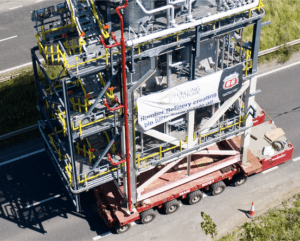Phillips 66 (Houston) announced that its Humber Refinery in the U.K. recently welcomed the latest addition to its growing renewable fuels infrastructure: a massive processing unit that will convert used cooking oil into low-carbon fuel.
“We are pleased to take delivery of our new UCO (used cooking oil) module at our Humber Refinery,” said Darren Cunningham, Refinery General Manager and Lead Executive for the U.K. “This highlights the refinery’s commitment and investment to further expand our production of biofuels and reinforces our reputation as the refinery of the future.”

The new UCO processing unit will increase the Humber Refinery’s production capacity for renewable fuels (Source: Phillips 66)
Standing nearly 50 feet (15 meters) tall and weighing in at 80 tons, the new used cooking oil module made quite the entrance. It rolled into the refinery grounds from a nearby assembly yard atop a self-propelled transporter, complete with a police escort to shepherd the oversized cargo.
Production of renewable diesel at Humber began in 2018, with the refinery becoming the first in the U.K. to convert waste oil into road fuel. The new UCO module will increase Humber’s renewable diesel capacity to 3,000 barrels per day from 1,000 BPD by January 2021. Plans are in the works to further expand capacity to 5,000 BPD by 2024.
The project also reaffirms the leading role the refinery and Phillips 66 are playing toward a lower-carbon future in the U.K. and beyond. Phillips 66 recently announced plans to convert its Rodeo Refinery in California into the world’s largest renewable fuels plant.
Humber already ranks among the most complex and sophisticated refineries in Europe. It is also a leader in the production of specialty coke used in the production of electric vehicle batteries.
The module, which includes two reactors and nearly 2,000 feet (600 meters) of pipework, was built nearby by engineering and construction firm Engie Fabricom and wheeled to the refinery for installation and commissioning.
“I would like to congratulate all the teams that have been working so hard on this project through such a turbulent time, delivering the project safely,” Cunningham said.